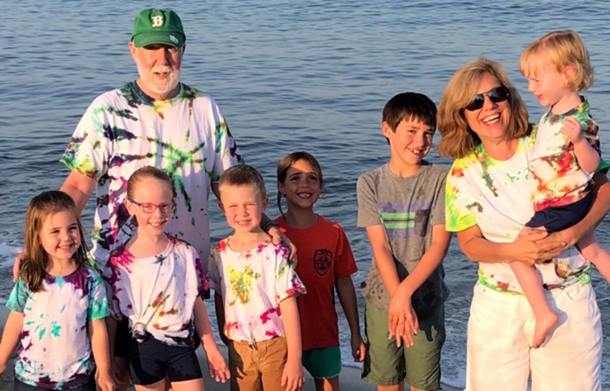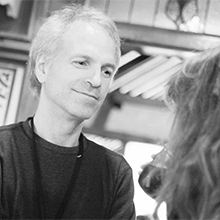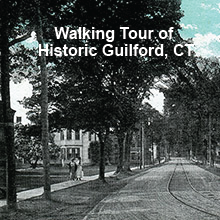Patient Stories
Welcome to the first of our ACKC Patient Stories series, where kidney cancer patients, and their caregivers, share their personal experiences. We encourage your comments, and if you have a story to share, please contact us.

Shaun T.
February 2007, I was a happy and healthy 51-year-old living with my wife Mary in New England. I played golf several times per week for exercise and always carried my bag. However, in the fall of 2006 I thought I pulled a groin muscle while golfing. I remember the exact moment like it was yesterday. It didn’t get better and seemed to transition to my right hip. For the next six months my former Primary Care Physician (PCP) treated me for bursitis of the hip with mega doses of Aleve (note: bad for kidneys). Since I was getting worse, not better, Mary insisted I go to another doctor. By then the pain was progressing up my right side and I was now strapping a heating pad to my side at work and at home. During the first appointment with my new PCP they did a complete physical and ordered an ultrasound to check my gallbladder. At 3 pm, Mary received a call asking us to come back to see the doctor that afternoon. They said to take our time, they would wait for us and to drive carefully because it was snowing.
After she called my office, I left work, picked her up and we drove to the doctor’s office. When we arrived, the doctor was waiting for us in an examination room. She was a long-time friend of the family and visibly upset. I instantly thought “This can’t be good.” She wasted no time and more or less blurted out “You have cancer!” Upon hearing her words, I went blank and tried to comprehend what had just happened. I walked in thinking I may need to miss a few weeks of work for gallbladder surgery, but this was life altering. Within a nanosecond everything we planned for and dreamed of was shattered by three simple words. Fortunately, Mary stayed focused and learned that the ultrasound had identified many soft tissue masses. The doctor was sure it was cancer, but didn’t know what type because it was widely spread throughout lung, liver, lymph nodes and both kidneys.
Thus began a marathon of imaging, labs and a biopsy to determine the primary cancer. Eventually we learned it was RCC. Before then I’d never heard of Renal Cell Carcinoma nor of kidney cancer. I was referred to a local general oncologist who said it was a rare cancer and he only saw a couple of cases each year. He said I was Stage IV, inoperable due to extent of spread including bones and this cancer did not respond to radiation or chemotherapy. He told us that I was terminal and suggested I spend time with my family and get my affairs in order. We were shocked and numb. After a couple of days I asked him for a referral to the Dana-Farber Cancer Institute in Boston. At my first appointment there, we met with a RCC specialist. He asked what I knew about my situation. I repeated what the first oncologist said to us and that his nurse told my insurance company 12-18 months of survival. The specialist listened carefully then took me by my shoulders, looked me straight in the eyes and said “Shaun, I’ve been a doctor a long time, examined countless patients and NEVER have I found an expiration date stamped on the bottom of a foot.” That got my attention.
He continued to calmly explain that much of what the first oncologist said would be true, if we were having the conversation a year earlier. He spoke of recent advances in radiation and two new “targeted” therapy drugs for RCC. He said one of them may help stabilize my cancer or even reduce my tumor volume, but neither would cure me. There was no cure then and there still isn’t. As he explained his plan, he also introduced the concept of living with cancer as a chronic illness. That was a completely new idea, which I hadn’t heard of before. The contrast between thinking my death was imminent one moment and considering the possibility of a future in the next was astounding! For 2½ hours this amazing man spoke in very plain terms laying out back-up plans and patiently answering every question we could think of. He gave it to us straight — that I was in desperate need of stability ASAP. He thought he could get that or more. I believed him and felt a strong bond almost instantly. When Mary and I left for the long drive home, we carried with us a glimmer of hope. That’s exactly what I needed and all I wanted: a chance to fight. I had found a like-minded man who was now the leader of my team.
We started with 15 days of very high dose IMRT radiation to mets on my lung, iliac bone, and the 5th right rear rib, which was already destroyed. We also radiated two spinal mets at T4 and T6, which were in contact with the spinal cord and threatening paralysis. After the radiation I began taking 50mg of Sutent on the standard cycle of 4 weeks on and 2 weeks off. Within the first six months it had reduced my tumor volume by nearly 50%. There was then a period of stability. After about three years on this cycle, the toxicity was severely affecting my labs and QOL. So we made the first of many adjustments to the dose and cycle. The goal was to keep me on Sutent as long as it was working for the majority of my tumor burden. In 2014, two new spinal mets appeared, and they were treated with SBRT (an extremely precise radiation technique commonly referred to as radio-surgery) and Vertbroplasty (a minimally invasive procedure using imaging guidance injecting bone cement to repair fractured or damaged vertebrae). My doctor didn’t consider that new bone mets signaled Sutent’s failing me, because the majority of my tumor burden was well controlled. So we stayed with it. There was then more stability until 2017, when one liver met doubled in size every three months. A decision was made to use cryoablation (a method of repeated freezing and thawing lesions) in an attempt to kill the tumor. It was in a very difficult location of the liver, but the highly skilled interventional radiologist at Dana-Farber/BWH used four cryoprobes to reach it from different angles and get great margins. In 2018, a couple of kidney tumors that had previously shrunk and been stable for years started growing slowly. Once again the same specialist used cryoablation to destroyed them.
On February 22, 2019 we celebrated my 12th cancerversary of living with Stage IV cancer as a chronic illness! I’ve also been on Sutent for more than 12 years now, which is almost unheard of in the world of RCC.
On that snowy Thursday afternoon in 2007, I thought my life was over. Never in my wildest imagination did I dare believe I’d still be alive today. But I am and have been blessed to have had my wife at my side every step of the way. She never wavered during the rough times and showed me how to celebrate the joyous ones. Since my diagnosis we have seen our three kids become caring, responsible adults and unique individuals. They make us so proud. I try to make them just as proud by how I deal with the adversity connected to living with cancer. They’ve also presented us with six absolutely beautiful grandchildren! Never in my wildest dreams did I think I’d see even one grandchild born or Mary explode with absolute bliss as she held each one for the first time. She continues to simply radiate whenever she’s around them. It gives me great comfort to know my disease has not destroyed her ability to experience happiness. I try very hard to imprint memories with the wee ones as their crazy grandfather who will take them on wild adventures, toss around or kick a ball whenever they ask, go sledding, eagerly play in the surf of Cape Cod or just act like a kid again whenever my treatment allows. I want them to never forget that I love them with every fiber of my being. I hope that someday when they’re older and know my whole story, it will help them persevere when faced with life’s challenges. That is the legacy I want to leave them when my time is up.
Without research none of the above would be possible and I would not be alive. The drug I take and the other treatments I listed are the result of research, clinical trials and fine tuning. Since my diagnosis, ongoing research has resulted is a total of twelve FDA approved drugs being available for RCC patients now. But there’s a need for more and less toxic ones. We still don’t have the cure either, but I am more confident than ever that recent research advances are bringing us much closer to that day. That’s why it is so important to support cancer research financially, by participating in one of the hundreds of clinical trials focused on RCC or by donating your time and talent.




March 23, 2019 at 2:42 pm, Sara Mears said:
Beautiful and inspiring story Shaun. Thank you for sharing. And kudos to Mary!
March 23, 2019 at 4:20 pm, Shaun T said:
Hi Sara, thank you for your support and, yes, my wife Mary has always been amazing. This may sound crazy with Stage IV cancer and all, but I’m a lucky guy to have her by my side!
March 23, 2019 at 5:08 pm, Nancy Hoey said:
Your story is so similar to my husband’s. Thank you for sharing and best of everything in the future.
March 23, 2019 at 8:24 pm, Pat R said:
Wow, you and your family have been through so much. Your story shows the struggles of dealing with kidney cancer. Your information will help a lot of people looking for answers and options. I am so glad you got a second opinion, your wife sounds very strong. Blessings, Shaun.
March 23, 2019 at 9:15 pm, Shaun T said:
Thank you Nancy. Are there details of your husband’s experience you can share with the ACKC community?
March 25, 2019 at 6:03 pm, Alan the CPA said:
Shaun a most wonderful story and I am so happy that you have taken the time and energy to share your experiences. As a fellow Stage 4 RCC patient on Sutent therapy, I now know that I have a comrade in arms having been alone for many years. Your 12 years are amazing. I am presently at close to 19 years, having originally started on IL-2 therapy, during my time I have also endured 2 heart attacks. We have spoken on the phone and I look forward to meeting with you in the near future. I am somewhat familiar with Nancy Hoey’s husbands’ story above from our individual contacts through Action To Cure Kidney Cancer (ACKC) and wish her all the best. I hope to contribute my personal experiences in the near future. Stay tuned.